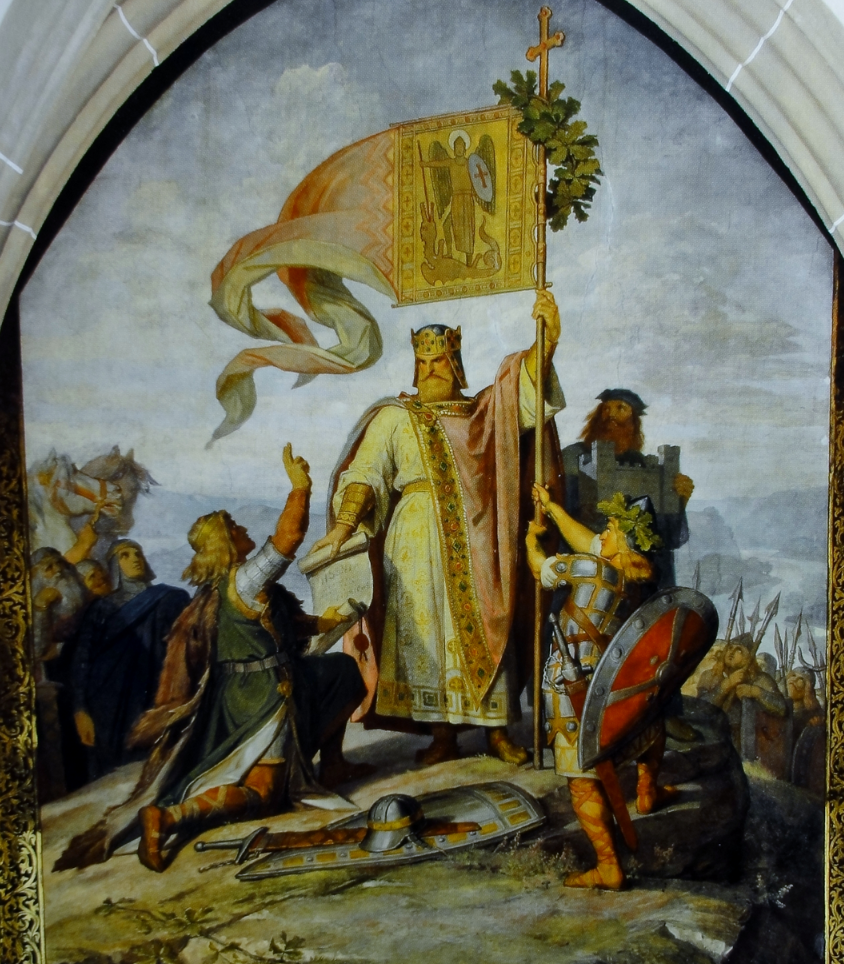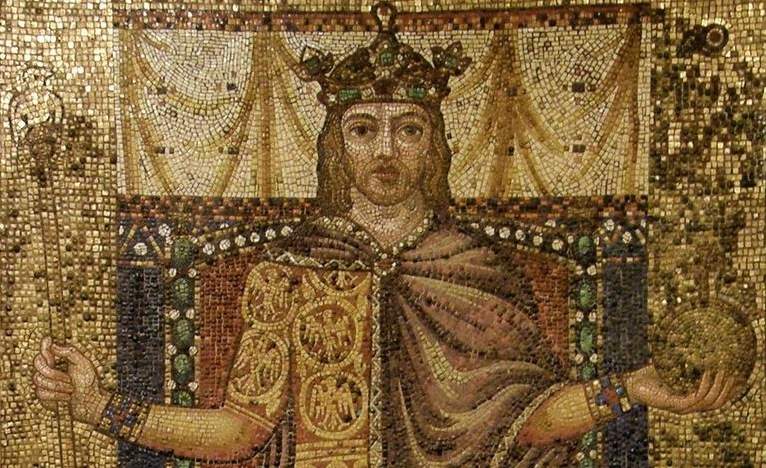Editor’s Note: The following comprises the eighth chapter of The Holy Roman Empire, by James Bryce (published 1871). All spelling in the original.
(Continued from Part 7)
CHAPTER VIII
THE ROMAN EMPIRE AND THE GERMAN KINGDOM
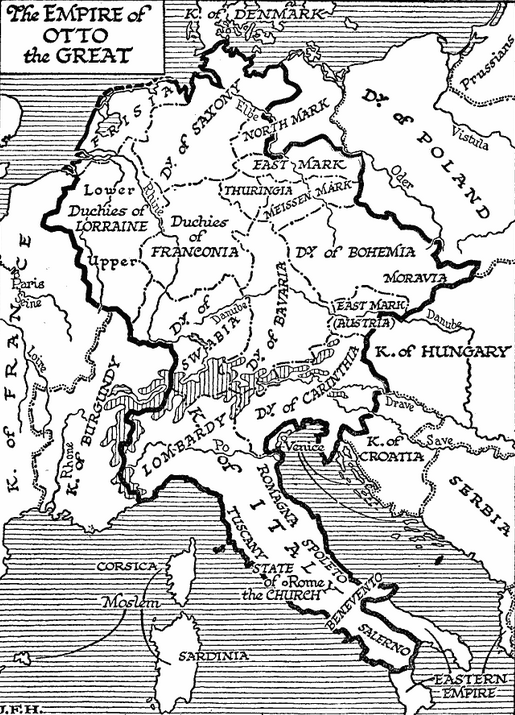
Union of the Roman Empire with the German kingdom
This was the office which Otto the Great assumed in A.D. 962. But it was not his only office. He was already a German king; and the new dignity by no means superseded the old. This union in one person of two characters, a union at first personal, then official, and which became at last a fusion of the two into something different from either, is the key to the whole subsequent history of Germany and the Empire.
Germany and its monarchy
Of the German kingdom little need be said, since it differs in no essential respect from the other kingdoms of Western Europe as they stood in the tenth century. The five or six great tribes or tribe-leagues which composed the German nation had been first brought together under the sceptre of the Carolingians; and, though still retaining marks of their independent origin, were prevented from separating by community of speech and a common pride in the great Frankish Empire. When the line of Charles the Great ended in A.D. 911, by the death of Lewis the Child (son of Arnulf), Conrad, duke of the Franconians, and after him Henry (the Fowler), duke of the Saxons, was chosen to fill the vacant throne. By his vigorous yet conciliatory action, his upright character, his courage and good fortune in repelling the Hungarians, Henry laid deep the foundations of royal power: under his more famous son it rose into a stable edifice. Otto’s coronation feast at Aachen, where the great nobles of the realm did him menial service, where Franks, Bavarians, Suabians, Thuringians, and Lorrainers gathered round the Saxon monarch, is the inauguration of a true Teutonic realm, which, though it called itself not German but East Frankish, and claimed to be the lawful representative of the Carolingian monarchy, had a constitution and a tendency in many respects different.
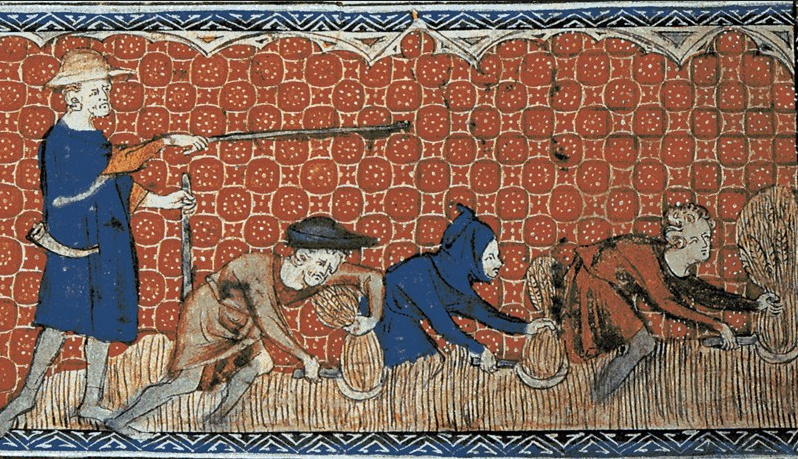
Feudalism
There had been under those princes a singular mixture of the old German organization by tribes or districts (the so-called Gauverfassung), such as we find in the earliest records, with the method introduced by Charles of maintaining by means of officials, some fixed, others moving from place to place, the control of the central government. In the suspension of that government which followed his days, there grew up a system whose seeds had been sown as far back as the time of Clovis, a system whose essence was the combination of the tenure of land by military service with a peculiar personal relation between the landlord and his tenant, whereby the one was bound to render fatherly protection, the other aid and obedience. This is not the place for tracing the origin of feudality on Roman soil, nor for shewing how, by a sort of contagion, it spread into Germany, how it struck firm root in the period of comparative quiet under Pipin and Charles, how from the hands of the latter it took the impress which determined its ultimate form, how the weakness of his successors allowed it to triumph everywhere. Still less would it be possible here to examine its social and moral influence. Politically it might be defined as the system which made the owner of a piece of land, whether large or small, the sovereign of those who dwelt thereon: an annexation of personal to territorial authority more familiar to Eastern despotism than to the free races of primitive Europe. On this principle were founded, and by it are explained, feudal law and justice, feudal finance, feudal legislation, each tenant holding towards his lord the position which his own tenants held towards himself. And it is just because the relation was so uniform, the principle so comprehensive, the ruling class so firmly bound to its support, that feudalism has been able to lay upon society that grasp which the struggles of more than twenty generations have scarcely shaken off.
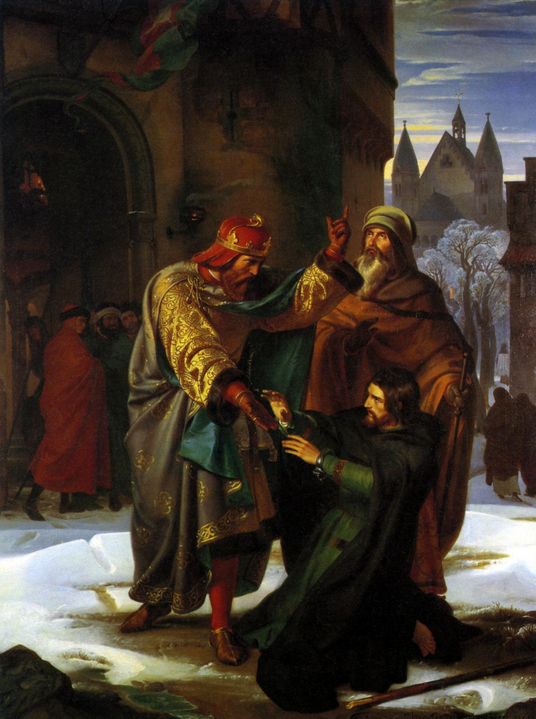
The feudal king
Now by the middle of the tenth century, Germany, less fully committed than France to feudalism’s worst feature, the hopeless bondage of the peasantry, was otherwise thoroughly feudalized. As for that equality of all the freeborn save the sacred line which we find in the Germany of Tacitus, there had been substituted a gradation of ranks and a concentration of power in the hands of a landholding caste, so had the monarch lost his ancient character as leader and judge of the people, to become the head of a tyrannical oligarchy. He was titular lord of the soil, could exact from his vassals service and aid in arms and money, could dispose of vacant fiefs, could at pleasure declare war or make peace. But all these rights he exercised far less as sovereign of the nation than as standing in a peculiar relation to the feudal tenants, a relation in its origin strictly personal, and whose prominence obscured the political duties of prince and subject.
The nobility
And great as these rights might become in the hands of an ambitious and politic ruler, they were in practice limited by the corresponding duties he owed to his vassals, and by the difficulty of enforcing them against a powerful offender. The king was not permitted to retain in his own hands escheated fiefs, must even grant away those he had held before coming to the throne; he could not interfere with the jurisdiction of his tenants in their own lands, nor prevent them from waging war or forming leagues with each other like independent princes. Chief among the nobles stood the dukes, who, although their authority was now delegated, theoretically at least, instead of independent, territorial instead of personal, retained nevertheless much of that hold on the exclusive loyalty of their subjects which had belonged to them as hereditary leaders of the tribe under the ancient system. They were, with the three Rhenish archbishops, by far the greatest subjects, often aspiring to the crown, sometimes not unable to resist its wearer. The constant encroachments which Otto made upon their privileges, especially through the institution of the Counts Palatine, destroyed their ascendancy, but not their importance. It was not till the thirteenth century that they disappeared with the rise of the second order of nobility. That order, at this period far less powerful, included the counts, margraves or marquises and landgraves, originally officers of the crown, now feudal tenants; holding their lands of the dukes, and maintaining against them the same contest which they in turn waged with the crown. Below these came the barons and simple knights, then the diminishing class of freemen, the increasing one of serfs.
The Germanic feudal polity generally
The institutions of primitive Germany were almost all gone; supplanted by a new system, partly the natural result of the formation of a settled from a half-nomad society, partly imitated from that which had arisen upon Roman soil, west of the Rhine and south of the Alps. The army was no longer the Heerban of the whole nation, which had been wont to follow the king on foot in distant expeditions, but a cavalry militia of barons and their retainers, bound to service for a short period, and rendering it unwillingly where their own interest was not concerned. The frequent popular assemblies, whereof under the names of the Mallum, the Placitum, the Mayfield, we hear so much under Clovis and Charles, were now never summoned, and the laws that had been promulgated there were, if not abrogated, practically obsolete. No national council existed, save the Diet in which the higher nobility, lay and and clerical, met their sovereign, sometimes to decide on foreign war, oftener to concur in the grant of a fief or the proscription of a rebel. Every district had its own rude local customs administered by the court of the local lord: other law there was none, for imperial jurisprudence had in these lately civilized countries not yet filled the place left empty by the disuse of the barbarian codes.
The Roman Empire and the German kingdom
This condition of things was indeed better than that utter confusion which had gone before, for a principle of order had begun to group and bind the tossing atoms; and though the union into which it drove men was a hard and narrow one, it was something that they should have learnt to unite themselves at all. Yet nascent feudality was but one remove from anarchy; and the tendency to isolation and diversity continued, despite the efforts of the Church and the Carolingian princes, to be all-powerful in Western Europe. The German kingdom was already a bond between the German races, and appears strong and united when we compare it with the France of Hugh Capet, or the England of Ethelred II; yet its history to the twelfth century is little else than a record of disorders, revolts, civil wars, of a ceaseless struggle on the part of the monarch to enforce his feudal rights, a resistance by his vassals equally obstinate and more frequently successful. What the issue of the contest might have been if Germany had been left to take her own course is matter of speculation, though the example of every European state except England and Norway may incline the balance in favour of the crown. But the strife had scarcely begun when a new influence was interposed: the German king became Roman Emperor. No two systems can be more unlike than those whose headship became thus vested in one person: the one centralized, the other local; the one resting on a sublime theory, the other the rude offspring of anarchy; the one gathering all power into the hands of an irresponsible monarch, the other limiting his rights and authorizing resistance to his commands; the one demanding the equality of all citizens as creatures equal before Heaven, the other bound up with an aristocracy the proudest, and in its gradations of rank the most exact, that Europe had ever seen. Characters so repugnant could not, it might be thought, meet in one person, or if they met must strive till one swallowed up the other. It was not so. In the fusion which began from the first, though it was for a time imperceptible, each of the two characters gave and each lost some of its attributes: the king became more than German, the Emperor less than Roman, till, at the end of six centuries, the monarch in whom two ‘persons’ had been united, appeared as a third different from either of the former, and might not inappropriately be entitled ‘German Emperor.’ The nature and progress of this change will appear in the after history of Germany, and cannot be described here without in some measure anticipating subsequent events. A word or two may indicate how the process of fusion began.
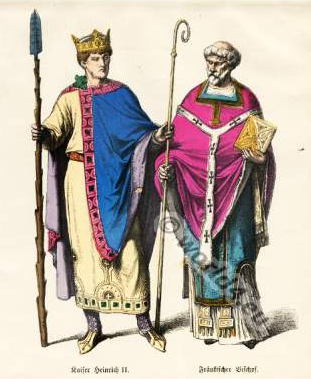
Results of this union in one person
It was natural that the great mass of Otto’s subjects, to whom the imperial title, dimly associated with Rome and the Pope, sounded grander than the regal, without being known as otherwise different, should in thought and speech confound them. The sovereign and his ecclesiastical advisers, with far clearer views of the new office and of the mutual relation of the two, found it impossible to separate them in practice, and were glad to merge the lesser in the greater. For as lord of the world, Otto was Emperor north as well as south of the Alps. When he issued an edict, he claimed the obedience of his Teutonic subjects in both capacities; when as Emperor he led the armies of the gospel against the heathen, it was the standard of their feudal superior that his armed vassals followed; when he founded churches and appointed bishops, he acted partly as suzerain of feudal lands, partly as protector of the faith, charged to guide the Church in matters temporal. Thus the assumption of the imperial crown brought to Otto as its first result an apparent increase of domestic authority; it made his position by its historical associations more dignified, by its religious more hallowed; it raised him higher above his vassals and above other sovereigns; it enlarged his prerogative in ecclesiastical affairs, and by necessary consequence gave to ecclesiastics a more important place at court and in the administration of government than they had enjoyed before. Great as was the power of the bishops and abbots in all the feudal kingdoms, it stood nowhere so high as in Germany. There the Emperor’s double position, as head both of Church and State, required the two organizations to be exactly parallel. In the eleventh century a full half of the land and wealth of the country, and no small part of its military strength, was in the hands of Churchmen: their influence predominated in the Diet; the archchancellorship of the Empire, highest of all offices, belonged of right to the archbishop of Mentz, as primate of Germany. It was by Otto, who in resuming the attitude must repeat the policy of Charles, that the greatness of the clergy was thus advanced. He is commonly said to have wished to weaken the aristocracy by raising up rivals to them in the hierarchy. It may have been so, and the measure was at any rate a disastrous one, for the clergy soon approved themselves not less rebellious than those whom they were to restrain. But in accusing Otto’s judgment, historians have often forgotten in what position he stood to the Church, and how it behoved him, according to the doctrine received, to establish in her an order like in all things to that which he found already subsisting in the State.
Changes in title
The style which Otto adopted shewed his desire thus to merge the king in the Emperor. Charles had called himself ‘Imperator Cæsar Carolus rex Francorum invictissimus;’ and again, ‘Carolus serenissimus Augustus, Pius, Felix, Romanorum gubernans Imperium, qui et per misericordiam Dei rex Francorum atque Langobardorum.’ Otto and his first successors, who until their coronation at Rome had used the titles of ‘Rex Francorum,’ or ‘Rex Francorum Orientalium,’ or oftener still ‘Rex’ alone, discarded after it all titles save the highest of ‘Imperator Augustus;’ seeming thereby, though they too had been crowned at Aachen and Milan, to claim the authority of Cæsar through all their dominions. Tracing as we are the history of a title, it is needless to dwell on the significance of the change. Charles, son of the Ripuarian allies of Probus, had been a Frankish chieftain on the Rhine; Otto, the Saxon, successor of the Cheruscan Arminius, would rule his native Elbe with a power borrowed from the Tiber.
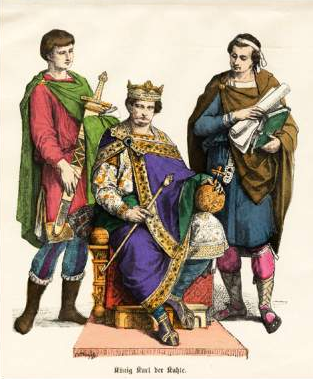
Imperial power feudalized
Nevertheless, the imperial element did not in every respect predominate over the royal. The monarch might desire to make good against his turbulent barons the boundless prerogative which he acquired with his new crown, but he lacked the power to do so; and they, disputing neither the supremacy of that crown nor his right to wear it, refused with good reason to let their own freedom be infringed upon by any act of which they had not been the authors. So far was Otto from embarking on so vain an enterprise, that his rule was even more direct and more personal than that of Charles had been. There was no scheme of mechanical government, no claim of absolutism; there was only the resolve to make the energetic assertion of the king’s feudal rights subserve the further aims of the Emperor. What Otto demanded he demanded as Emperor, what he received he received as king; the singular result was that in Germany the imperial office was itself pervaded and transformed by feudal ideas. Feudality needing, to make its theory complete, a lord paramount of the world, from whose grant all ownership in land must be supposed to have emanated, and finding such a suzerain in the Emperor, constituted him liege lord of all kings and potentates, keystone of the feudal arch, himself, as it was expressed, ‘holding’ the world from God. There were not wanting Roman institutions to which these notions could attach themselves. Constantine, imitating the courts of the East, had made the dignitaries of his household great officials of the State: these were now reproduced in the cup-bearer, the seneschal, the marshal, the chamberlain of the Empire, so soon to become its electoral princes. The holding of land on condition of military service was Roman in its origin: the divided ownership of feudal law found its analogies in the Roman tenure of emphyteusis. Thus while Germany was Romanized the Empire was feudalized, and came to be considered not the antagonist but the perfection of an aristocratic system. And it was this adaptation to existing political facts that enabled it afterwards to assume an international character. Nevertheless, even while they seemed to blend, there remained between the genius of imperialism (if one may use a now perverted word) and that of feudalism a deep and lasting hostility. And so the rule of Otto and his successors was in a measure adverse to feudal polity, not from knowledge of what Roman government had been, but from the necessities of their position, raised as they were to an unapproachable height above their subjects, surrounded with a halo of sanctity as protectors of the Church. Thus were they driven to reduce local independence, and assimilate the various races through their vast territories. It was Otto who made the Germans, hitherto an aggregate of tribes, a single people, and welding them into a strong political body taught them to rise through its collective greatness to the consciousness of national life, never thenceforth to be extinguished.
The Commons
One expedient against the land-holding oligarchy which Roman traditions as well as present needs might have suggested, it was scarcely possible for Otto to use. He could not invoke the friendship of the Third Estate, for as yet none existed. The Teutonic order of freemen, which two centuries earlier had formed the bulk of the population, was now fast disappearing, just as in England all who did not become thanes were classed as ceorls, and from ceorls sank for the most part, after the Conquest, into villeins. It was only in the Alpine valleys and along the shores of the ocean that free democratic communities maintained themselves. Town-life there was none, till Henry the Fowler forced his forest-loving people to dwell in fortresses that might repel the Hungarian invaders; and the burgher class thus beginning to form was too small to be a power in the state. But popular freedom, as it expired, bequeathed to the monarch such of its rights as could be saved from the grasp of the nobles; and the crown thus became what it has been wherever an aristocracy presses upon both, the ally, though as yet the tacit ally, of the people. More, too, than the royal could have done, did the imperial name invite the sympathy of the commons. For in all, however ignorant of its history, however unable to comprehend its functions, there yet lived a feeling that it was in some mysterious way consecrated to Christian brotherhood and equality, to peace and law, to the restraint of the strong and the defence of the helpless.

